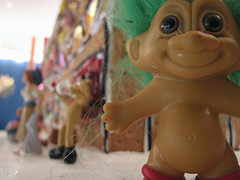Are ‘Patent Trolls’ the Secret Heroes of the Tech World?
Joikusoft is a small Finnish company that invented an innovative technology used on mobile devices, principally in Europe - it allows cell phones, mostly Nokia devices, to use their Wi-Fi radios to create hot spots that are connected to the wider Internet via the phone’s 3G or 4G radio.

cc Pete Jelliffe
If this sounds familiar, it’s because almost everyone offers their own version of this technology - Novatel’s MiFi, Palm, Sierra Wireless, even Google. But, arguably, JoikuSoft got there first. In 2007, it filed for a patent on the technology. Later, it let other companies play with the technology - notably Google - which, after letting the conversation with JoikuSoft drop, went on to implement its own version of the technology.
A Flawed Patent System
Google is not exceptional in this behavior. Tech companies do stuff like this every day. It’s impolite, but it’s not actionable. Until the U.S. Patent Office grants JoikuSoft a patent on its technology, it doesn’t own it and can’t demand a licensing fee from anyone who builds their own version of it. Getting this all-important patent can take up to five years, says Ted Shelton, an entrepreneur and technology consultant who is helping JoikuSoft navigate these waters.
The problem is that while JoikuSoft waits on this patent, it’s earning $0 in licensing fees for technology that it invented. That’s a flaw in the patent system, argues Shelton, because the technology world moves so quickly that by the time a patent is issued, the technology it covers could already be on its way out.
Litigation No One Can Afford
The second, more vexing problem is that even if JoikuSoft gets a patent on its technology, no big company even has to pay it a licensing fee. That’s because the bigger company can just bury the little one in patent litigation - outspending the small fry in the courtroom and tying up licensing fees for a decade.
If you don’t think Google is capable of that sort of thing, you haven’t been following its fight with Skyhook Wireless, a geolocation company that claims that Google not only stole its technology, but actually forced handset maker Motorola to dump Skyhook’s technology in favor of Google’s. (Google has yet to answer this claim.)
So, back to JoikuSoft. In an imaginary 2012 in which the company gets lucky, gets a patent issued, and asks Google, Palm, Novatel etc. to pay a licensing fee, what happens if these companies say no? JoikuSoft’s only recourse would be to respond with a patent infringement suit. It’s likely that suit would immediately go before a judge tasked with making a “rapid judgment” about the merit of the claim.
“The problem is that these are very complex technologies,” says Shelton. “But making a case for why another company is infringing or not relies ultimately on these snap judgments that are determined by much how money you can can put behind a team of lawyers with fancy multimedia presentations. A small company can hardly mount a defense against a Google.”
Patent Trolls to the Rescue
That’s where so-called “patent trolls” come in. If you’re a small company, you at least have the threat of selling your IP to a company that specializes in suing big companies and/or forcing them to pay licensing fees for patents. In this instance, patent trolls are essentially the only thing standing between small companies that need and deserve financial incentives in order to continue being the engines of innovation in the tech world, and big companies who could otherwise crush them in the courtroom.
Shelton isn’t arguing that patent trolls don’t do plenty of questionable things, as well, including amassing huge portfolios of junk patents and then forcing large companies to license the entire package. But just as we wouldn’t want to live in a world in which product liability law didn’t exist, areas of the law that are sometimes abused can have value in the cases when they’re not.
The problem is finding that balance. “I don’t have an answer,” says Shelton. “But the point is that there is a use for ‘patent trolls’ because some companies are bad actors - we need checks and balances.”
Keep Reading
Most Popular
How scientists traced a mysterious covid case back to six toilets
When wastewater surveillance turns into a hunt for a single infected individual, the ethics get tricky.
The problem with plug-in hybrids? Their drivers.
Plug-in hybrids are often sold as a transition to EVs, but new data from Europe shows we’re still underestimating the emissions they produce.
What’s next for generative video
OpenAI's Sora has raised the bar for AI moviemaking. Here are four things to bear in mind as we wrap our heads around what's coming.
Stay connected
Get the latest updates from
MIT Technology Review
Discover special offers, top stories, upcoming events, and more.